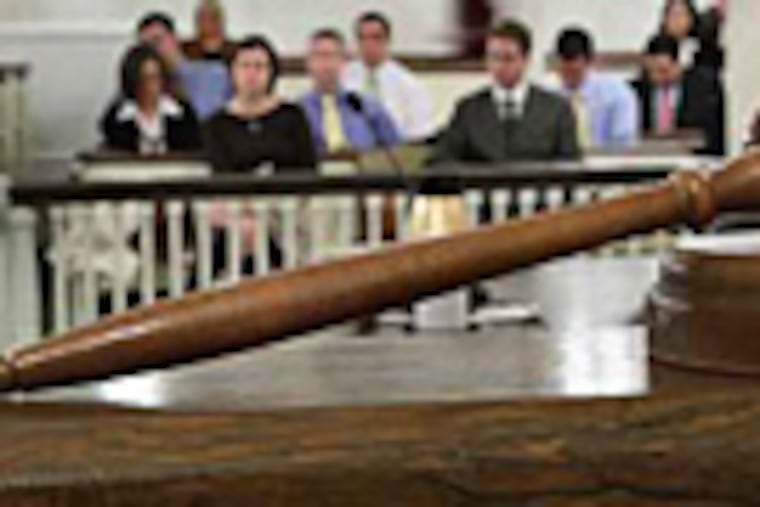Blind lawyer: Pro took me for 8G
Whether it was prostitution or Pilates, a blind Delaware County lawyer is hoping for a better outcome after his federal civil suit against a Philadelphia woman and a credit-card company was thrown out last week.

Whether it was prostitution or Pilates, a blind Delaware County lawyer is hoping for a happy ending after his federal civil suit against a Philadelphia woman and a credit-card company was thrown out last week.
John F. Peoples, 60, was steamed after he learned that the woman who he says he hired for sex allegedly overbilled his Discover card by $8,600.
So he sued her for damages and the credit-card company for alleged violations of the Americans with Disabilities Act, claiming that it had not sufficiently protected its blind customers.
"This wouldn't have happened to a sighted person," Peoples said yesterday, adding that he plans to appeal.
In court documents, the woman named in the suit, Ginger Dayle, said that she had provided Pilates lessons to Peoples and denied that she was a prostitute or that she had defrauded his credit card.
She filed a countersuit claiming that Peoples had inappropriately touched her butt and that he initiated the lawsuit after she rebuffed his sexual advances, according to court documents.
That case also was dismissed.
Peoples, 60, of Broomall, who has been legally blind since birth, claims to have met Dayle through an escort-services Web site.
He said that he had sessions with her about every other week for six months in 2007 at $275 to $375 an hour.
He said that he charged the sessions to his Discover card and signed a receipt - which he couldn't see - that Dayle told him had the agreed-upon amount - usually $750 for two hours.
But on 11 occasions, Dayle actually charged him $1,100 and in one case $1,600, "knowing he was blind and could not see he was being tricked," according to court records.
Peoples also claimed that she had forged his signatures on slips for days that did not use her services.
He said that he realized the alleged fraud only when his mother read him his credit-card bill.
When Peoples reported the alleged fraud to Discover, it failed to take any action, court documents said.
In his suit, he cited the Americans with Disabilities Act, claiming that Discover does not provide "reasonable accommodations" for blind consumers to use their services without running the risk of being defrauded by merchants.
In his initial complaint, Peoples did not allege that Dayle was a prostitute, saying only that she "advertises herself as an expert at providing personal, hands-on service to individual customers in private sessions at a set rate," according to court documents.
It was only during his deposition in October 2008, that he first stated that those services were prostitution, court documents said.
When asked during deposition if he ever, as a lawyer, thought twice about using a prostitute, he said, according to court documents: "It doesn't bother me because it doesn't affect my practice of law. Prostitution, I believe, is a misdemeanor. Even if convicted, it would not be a problem for the disciplinary board."
In an interview yesterday, Peoples said that many blind men "get stuck" using prostitutes because it's hard to meet women.
"If you go to a singles bar with a stick in your hand, you're not going to be attacked by women," he said. "Women aren't too interested in blind men."
He said that he had the chutzpah to bring the suit because he figured this was the only way to "make her pay."
"They figure nobody will do anything to them and people will be too embarrassed, and that's why this happens," he said.
Dayle, who bills herself as a fitness instructor, professional dancer, actor and an adjunct professor, denied being a prostitute in court documents.
When reached yesterday, she declined to comment except to say that the case was "bad publicity." She referred all questions to her attorney, William Reil, who did not return calls for comment.
Peoples said that Dayle's claims that she had provided him with Pilates lessons were "ridiculous."
"I have arthritis, diabetes and chronic fatigue syndrome," he said.
In court documents, he said that he was "barely able to walk, let alone do Pilates" and that sex is "one of the few exercises I get to do."
In his memorandum, U.S. District Judge Edmund Ludwig dismissed Peoples' claim against Discover and said that he couldn't recover his disputed charges because they were for an illegal and "prohibited transaction," which constituted a breach of the card-member agreement.
Ludwig also said in court documents that the Americans with Disabilities Act (ADA) did not apply in the case because it refers only to a "public accommodation."
Martin C. Bryce Jr., an attorney for Discover on the case, explained: "The use of a credit card in this instance did not fall under the ADA because the ADA applies to places and a credit card is not a place," he said.
Peoples said that he was upset that the statute had been interpreted not to include credit-card companies.
"I don't think the people who designed the ADA and put it into words expected credit-card companies not to help us," he said. "This denies the blind access to credit cards. If you can be cheated, then you can't use credit cards."